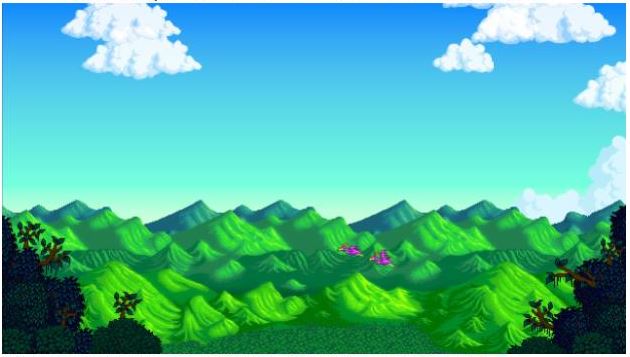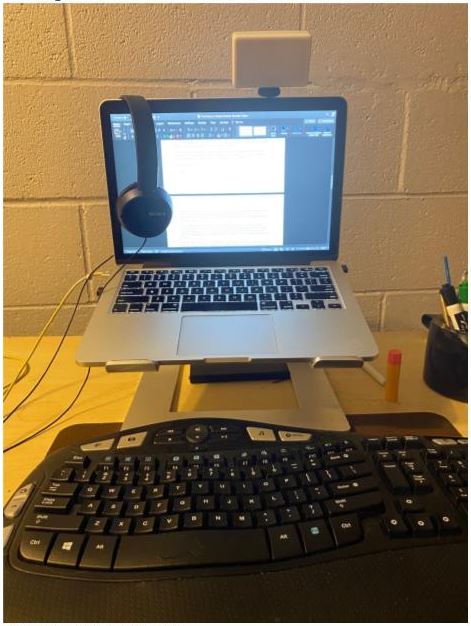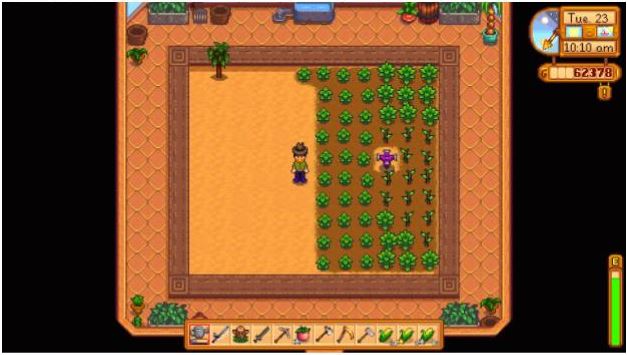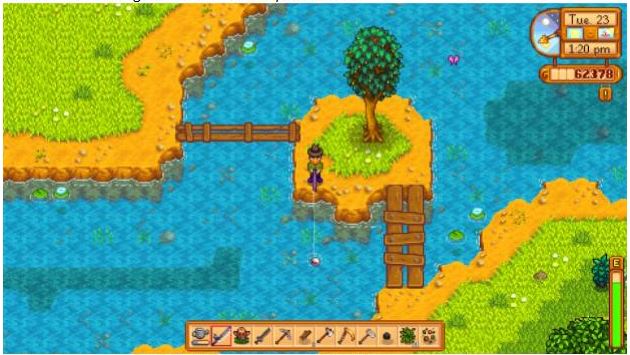By Dylan Altman, California State University, Northridge

“Every spirit builds itself a house; and beyond its house a world; and beyond its world, a heaven. Know then, that the world exists for you. For you is the phenomenon perfect. What we are, that only can we see… Build, therefore, your own world.”
Ralph Waldo Emerson, Nature
Emerson was definitely not talking about the power of video games to serve as a representation of nature, or how this virtual trek into nature can serve as an emotional journey into understanding ourselves; however, why not use this as a starting point?
I mean, obviously, Emerson had no concept of a video game or a digital world. And, if he would have known about it, he most likely would have recoiled from modern people’s need for “virtual” escapades into nature.
However, when our physical jaunts into nature our limited due to the many circumstances out of our control (flood, fire, super storms, pandemic, parenthood, et al.), can the virtual world of nature still allow for that reflection to happen?
Heck yes, and over the last six months, Stardew Valley has become my “own world.”
Personal Shift in Gaming
I have been a gamer since 1992. In fact, the first game I ever played was Sonic the Hedgehog. This wasn’t a pastoral RPG like Stardew Valley. This wasn’t a thoughtful adventure game. It
wasn’t a game that explored nuances in ethics. It was a classic fast-paced side-scroller with one objective in mind: run fast and survive.
Maybe because this kind of fast-paced-game was my first entrance into video games, but I was first drawn to these side-scrollers, action games, and adventure games.
I didn’t really care about the depiction of the world or to see the pixelated representations of nature. I just wanted stories that were character driven, quests that made me laugh, or action driven levels that required precision and expertise. I gamed for the thrill and for the challenge. I wanted the immediacy of a narrative, or I craved the immediacy of an actionable objective that needed to be accomplished.
However, when I wasn’t playing video games as a kid, I was exploring nature and creating adventures. I grew up in sunny Southern California, and there was always a hiking trail ready; I had perpetual good weather to explore the mountainsides, venture into unknown areas, build swing-sets from old trees, and let my imagination run wild. I didn’t crave nature, as it was literally right in my back yard.
Shigeru Miyamoto, the creator of Zelda, has said that his inspiration for Zelda and game-making came from his own experiences exploring the caves and hillsides near Kyoto. Unsatisfied with simply creating an objective based game, Miyamoto wanted to focus on experience. He used the gaming format to try and show Link’s sense of wonderment and awe at the power of nature.
When I moved away from nature and “ grew up,” I began to feel disconnected from that nature and that sense of home. Like Miyamoto, I missed my explorations, but more importantly, I missed my wonder at what I now considered mundane. I began to play different games for different reasons. I played games like Morrowind and Oblivion now not only for story, but also for the sense of awe and excitement I felt as I travelled in the Elder Scrolls universe. As I discovered new areas and saw the pixelated world begin to smooth and become more detailed, my love of gaming shifted again. I began to crave that nostalgic sense of wonder in these new digital worlds.
This didn’t translate directly into a desire to play simulators. In fact, I’ve tried my hand at a ton of walking and life simulators: The Sims, Journey, Myst, etc. I had fun testing the limits of the game, but I quickly became bored of them and either used cheats or just quit. I never took the games seriously or really wanted to invest any time in them.
Overall, I didn’t pay attention to games that tried to “mimic” an aspect of our world. Who cares about the normal world? Who cares about the mundane? I wanted to see aliens. I wanted to rob banks. I wanted to become an assassin. Who wants to be a farmer?
And then Covid-19 Hit.

I was lucky. I had work. I couldn’t complain. As an Adjunct Professor at a few colleges, my work wasn’t immediately affected by the March 2019 Stay-at-Home orders. In fact, I had been teaching online for a few years, so I was one of the few people who felt comfortable with the transition to completely online teaching.
At first, I appreciated the little things. I had more time with my family. I had time to eat breakfast every morning. I even had time to play a bit of video games after my kid fell asleep. I was always a glass half-full kind-of-guy, so I tried to pay attention to just that, and I tried to
shrug off the growing death tolls, the deaths of a few colleagues, and the ever growing quarantine fatigue.
And then the coronavirus continued. The hikes I planned were cancelled. Our 18-month old son became a two year old. The rising death tolls closed our parks. And my wife and I’s conversation about having a baby turned into a positive pregnancy test. To quote Jurassic Park’s Dr. Ian Malcom, “Life, uh finds a way.”
I was happy, but I was overwhelmed. I wanted a break from the madness of the world; I wanted routine; I wanted to control something in the chaos that was surrounding me. Finally, I gave in and tried the game that my friends had been telling me about for years: Stardew Valley. And without even realizing it, my gaming preference changed again.
Starfruit Addiction

At the very start of the Stardew Valley, like many RPGs, you get to create your character. It seemed rather minimal compared to games like Skyrim and Fallout, so I didn’t take it seriously. I chose a funny name, made a funny looking character, and I didn’t think I’d be playing long. But then, despite the seemingly archetypical beginning, I was sucked into the story.
I watched as my character, upset with his life working in the city, decides to move to his grandfather’s farm. As I worked from home and felt the emptiness of the online classroom, I could only admire this character. Staking your claim and working with your hands seemed appealing, even if it was just in the online world. Within minutes, this pixelated avatar was immediately a character that I understood and wanted to be.
I started to play the game. In my first year, I planted my garden haphazardly. If I had a seed, I’d plant it. I didn’t care for order in my garden and I didn’t really understand the game. Gardening was just a task I needed to accomplish. I was an adventurer; I wasn’t a farmer. I would get my watering done, and then I’d go explore. I’d go down as many levels as I could in the mines. I’d chop a path. I’d try to improve my home. I’d try to talk to every villager. Ever so slowly, I developed a routine in the game.
With the chaos around me, the routine that I established became comforting. My character wakes at 6am, waters the plants, harvests the food, sells what he can, buys replacement seeds, and goes to the mines if it isn’t too late. And repeat.
I wasn’t just an instructor typing comments on students papers anymore; I was a farmer contributing to this virtual community.
The routine of these digital everyday actions began to feel like a mantra. Although the game’s message argued for a return to the pastoral, I began to see multiple messages reflected in the gameplay: “Focus on what is in front of you. Plant your seeds at the right time. Adventure can always surprise you.” By the end of my second year, I began to feel like a true member of the Stardew Valley community.
I also understood the irony of the game. Stardew Valley is about someone upset at the rat-race of their life in the city, so they “quit” the digital world. They move to a village and start a farm. They live simply, and focus on life. Here I was, struggling with the complete digitalization of my life, and I picked up another digital world to get lost in. However, I didn’t care about the irony. In fact, I embraced it. The virtual space of Stardew Valley gave me a place to roam and explore when we were all forced to be stuck inside.
As I became more comfortable in my gameplay, I began to try and master the game even more. I joined the r/StardewValley subreddit. I bookmarked the Stardew Valley Wikipedia. I learned about yield optimization. I started a physical journal to document the items I still needed to collect. I had lists of chores in game that needed to be done or my world would begin to fall apart.
I became serious about the game; I needed to get the bigger house; I needed to get the Auto-Grabber and Auto-Petter; I needed more Iridium Sprinklers; and I needed the Iridium sprinklers spaced in a specific pattern. Soon, the game didn’t feel like a game anymore. It began to feel just as stressful as my real life, and I found myself avoiding playing at the end of the day.
I had become so stuck in mastering the Stardew Valley world, that I didn’t think about the point of the game, or the reason I fell in love with it in the first place. I needed to give up on trying to master the game, and instead play the game for the sake of Play. I needed to let go and have fun.
So, I shifted my gaming perspective again. I began to slow down and appreciate the little things in the game. As I made more gold and achieved more in-game goals, I began to focus more on what the game was doing with its medium instead of trying to figure out how I can “beat the game.” I stood at the end of the Pier and appreciated the game’s sunset. I sat and watched the townspeople intermingle at the Stardrop Saloon on a Friday. I watched as my funnily-named chickens hatched from their eggs, and I burst out laughing when I accidentally ate the duck’s egg in front of the duck. It
While the real world was getting crazier by the minute, I always knew I could go to Stardew Valley at the end of the day and water my crops. Despite the virtual world, Stardew Valley became my breath of fresh air again. Just these simple actions gave me peace of mind. And the exploration within game allowed me to go adventuring in “nature,” despite the state orders not to venture outside. Eventually, the town became a comfort in these trying times. Playing at the end of the day was a chance to go where, “everyone knows my name,” despite being hidden away during quarantine.
Stardew Valley’s use of nature as a portal to discovery happens for the player and the hero. As Emerson says, with “What we are, that only we can see.. build, therefore, your own world.” While building our digital world, the mundane actions of Stardew life become meditative, comforting, and hypnotic. Despite its digital format, the nature within the world allows us to create our own refuge and our home away from home.

About the Author
Dylan Altman is an avid gamer, a sometimes author, a “hip” professor, a struggling human being, and father of one, soon-to-be two. He teaches at his alma mater California State University, Northridge and at several Community Colleges in California.
This piece is part of a series written by CPGS members about current thoughts, reflections, or projects in and around games and gaming. If you are a CPGS member and would like to contribute to these musings, please contact Beth Caravella at caravell@yorku.ca or via the CPGS Discord.

this is such a great article dylan!!
i really enjoyed reading it
well done!!
LikeLike